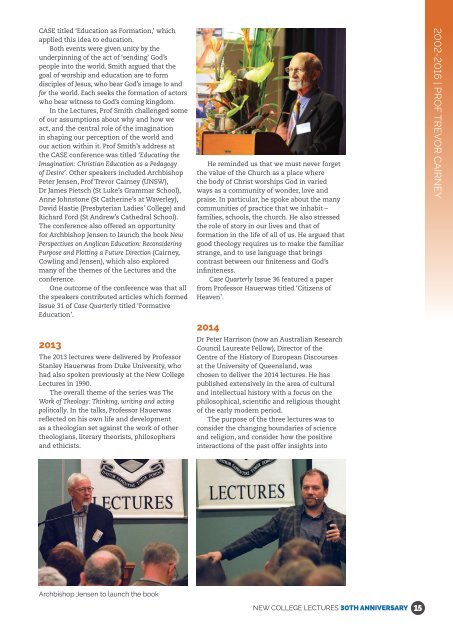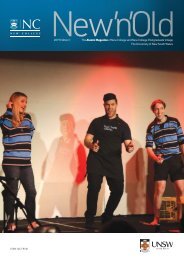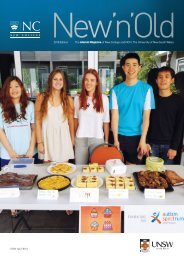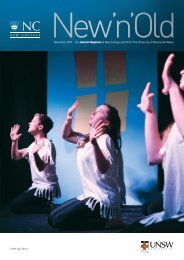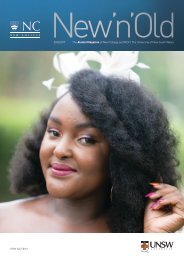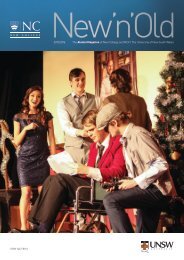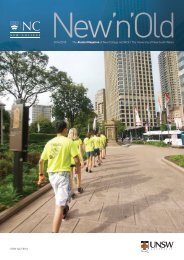You also want an ePaper? Increase the reach of your titles
YUMPU automatically turns print PDFs into web optimized ePapers that Google loves.
CASE titled ‘Education as Formation,’ which<br />
applied this idea to education.<br />
Both events were given unity by the<br />
underpinning of the act of ‘sending’ God’s<br />
people into the world. Smith argued that the<br />
goal of worship and education are to form<br />
disciples of Jesus, who bear God’s image to and<br />
for the world. Each seeks the formation of actors<br />
who bear witness to God’s coming kingdom.<br />
In the Lectures, Prof Smith challenged some<br />
of our assumptions about why and how we<br />
act, and the central role of the imagination<br />
in shaping our perception of the world and<br />
our action within it. Prof Smith’s address at<br />
the CASE conference was titled ‘Educating the<br />
Imagination: Christian Education as a Pedagogy<br />
of Desire’. Other speakers included Archbishop<br />
Peter Jensen, Prof Trevor Cairney (UNSW),<br />
Dr James Pietsch (St Luke’s Grammar School),<br />
Anne Johnstone (St Catherine’s at Waverley),<br />
David Hastie (Presbyterian Ladies’ College) and<br />
Richard Ford (St Andrew’s Cathedral School).<br />
The conference also offered an opportunity<br />
for Archbishop Jensen to launch the book New<br />
Perspectives on Anglican Education: Reconsidering<br />
Purpose and Plotting a Future Direction (Cairney,<br />
Cowling and Jensen), which also explored<br />
many of the themes of the Lectures and the<br />
conference.<br />
One outcome of the conference was that all<br />
the speakers contributed articles which formed<br />
Issue 31 of Case Quarterly titled ‘Formative<br />
Education’.<br />
2013<br />
The 2013 lectures were delivered by Professor<br />
Stanley Hauerwas from Duke University, who<br />
had also spoken previously at the New College<br />
Lectures in 1990.<br />
The overall theme of the series was The<br />
Work of Theology: Thinking, writing and acting<br />
politically. In the talks, Professor Hauerwas<br />
reflected on his own life and development<br />
as a theologian set against the work of other<br />
theologians, literary theorists, philosophers<br />
and ethicists.<br />
He reminded us that we must never forget<br />
the value of the Church as a place where<br />
the body of Christ worships God in varied<br />
ways as a community of wonder, love and<br />
praise. In particular, he spoke about the many<br />
communities of practice that we inhabit –<br />
families, schools, the church. He also stressed<br />
the role of story in our lives and that of<br />
formation in the life of all of us. He argued that<br />
good theology requires us to make the familiar<br />
strange, and to use language that brings<br />
contrast between our finiteness and God’s<br />
infiniteness.<br />
Case Quarterly Issue 36 featured a paper<br />
from Professor Hauerwas titled ‘Citizens of<br />
Heaven’.<br />
2014<br />
Dr Peter Harrison (now an Australian Research<br />
Council Laureate Fellow), Director of the<br />
Centre of the <strong>History</strong> of European Discourses<br />
at the University of Queensland, was<br />
chosen to deliver the 2014 lectures. He has<br />
published extensively in the area of cultural<br />
and intellectual history with a focus on the<br />
philosophical, scientific and religious thought<br />
of the early modern period.<br />
The purpose of the three lectures was to<br />
consider the changing boundaries of science<br />
and religion, and consider how the positive<br />
interactions of the past offer insights into<br />
2002-2016 | PROF TREVOR CAIRNEY<br />
Archbishop Jensen to launch the book<br />
NEW COLLEGE LECTURES 30TH ANNIVERSARY<br />
15


